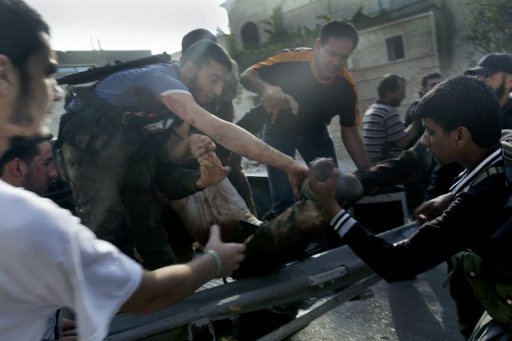A Syrian air force colonel won political asylum after landing his MiG fighter in Jordan, as a watchdog reported the deadliest day of fighting in Syria since the battered April ceasefire.
The pilot, who reportedly flew his jet under the radar to safely cross the border, was the first to defect from one of the most privileged branches of Syria’s security forces.
It came as human rights monitors reported that at least 168 people had died in Thursday’s clashes inside Syria, one of the bloodiest days since the uprising began in March 2011.
Earlier, a government official had said the Russian MiG-21 made an emergency landing at a base in Mafraq near the border.
Syrian state television said the plane was near the border when contact was lost at 0734 GMT. Jordan said it crossed the frontier minutes later.
The opposition Syrian National Council said that the plane “took off at high speed and flew at low altitude from a military base between Daraa and Sweida in the south of the country… to avoid detection by radar.”
The pilot is from Deir Ezzor, in eastern Syria, “and his family is known for its opposition” to the regime of President Bashar al-Assad, spokesman George Sabra said.
The Syrian defence ministry denounced Hamade in a statement on state television as a “deserter and a traitor to his country, and to his military honour,” and said that “he will be sanctioned under military rules.”
Syria has made contact with Jordan to arrange for the return of the jet, the statement added.
Washington welcomed the defection.
Tens of thousands of soldiers have defected since the revolt against Assad’s rule erupted in March last year, with thousands joining the rebel Free Syrian Army, according to the Syrian Observatory for Human Rights.
The air force had previously been seen as a loyal arm of the regime. Assad’s father Hafez headed the service before seizing power in 1970, and air force intelligence remains one of the most feared branches of the security services.
Diplomats, meanwhile, stepped up their efforts to stem the bloodshed.
Arab states called for Russia to stop arming Syria.
He also called for the mandate of UN and Arab League envoy Kofi Annan to be revamped, and for Iran’s inclusion in talks on ending the conflict.
UN chief Ban Ki-moon discussed the situation in Syria on Thursday with Iranian President Mahmoud Ahmadinejad on the sidelines of the United Nations Conference on Sustainable Development in Rio, said a spokesman for Ban.
Iran is one of the Assad regime’s last allies.
In comments to reporters later, Ahmadinejad denounced Western interference in Syria, accusing them of pursuing their own interests.
Both London and Washington denied a report in British newspaper The Guardian that they were working on an initiative for regime change based on Annan’s UN-backed plan that calls for a “Syrian-led political transition.”
Reports said Britain and the United States have discussed offering Assad immunity from prosecution if he steps down as part of a political transition.
But Britain’s Foreign Office said “no new offer” was on the table, and at the State Department Nuland also said there was “no truth” to the story.
Russian Foreign Minister Sergei Lavrov, whose government retains close ties with Damascus, said any peace plan that calls for Assad to leave power and go into exile would not work because he would not quit.
In the latest bloodshed, 168 people, mainly civilians, were killed, the London-based Syrian Observatory for Human Rights said.
Observatory director Rami Abdel Rahman told AFP that it was “the bloodiest day since the start of the ceasefire (on April 12) and one of the bloodiest since the start of the revolt against the Syrian regime.”
Among the hardest hit was the central region of Homs, where 31 civilians and a rebel fighter died, the Observatory said.
The bombardment halted attempts by the International Committee of the Red Cross and the Syrian Red Crescent to evacuate trapped civilians, but the agencies vowed to try again on Friday.
Hundreds of people are believed to be trapped in the historic heart of Syria’s third-largest city, unable to flee or find shelter because of the fighting, the Geneva-based agency said.
More than 15,000 people have been killed since the revolt against Syrian President Bashar al-Assad’s regime began in March 2011, according to the Observatory.

COMMENTS
Please let us know if you're having issues with commenting.